Thursday, March 02, 2006
A couple comments about the new DVD release of Raise the Red Lantern
Wednesday, March 01, 2006
Americans worse off financially
Corporate profits have surged since the 2001 recession. Stock market values for the roughly half of all households with such investments have rebounded somewhat from the tech and telecom bust. A housing boom has increased many families’ paper net worth, allowing them to borrow against their homes to support their spending.
But the median U.S. household income declined from $46,058 in 2000 to $44,389 in 2004, when adjusted for the rate of inflation, according to the U.S. Census Bureau. This means half of all households earned more and half less.
Similarly, the mean (or average) household income slipped from an inflation-adjusted $62,671 to $60,528 over the same period, the bureau reported.....
Job losses, difficulty finding re-employment quickly, and landing new jobs that pay less than the old ones have all contributed to the financial crunch in many households. But the financial stresses facing households run deeper.
But I'm sure it's Clinton's fault. Or the terrorists. Of course, if the trend were reversed, Bush would be taking full credit.
Tuesday, February 28, 2006
How many for how long?
How many civil liberties would you give up to win the war on terror? And for how long? The response, "For as long as it takes", will be assumed to mean for the rest of your life, given that there is no clearly defined milestone for victory.
(A smartass might interject that the Commander-in-Chief declared "Mission Accomplished" more than 30 months ago.)
Monday, February 27, 2006
The Far Country
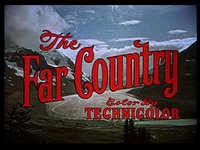 For the next few weeks, we here at Liverputty will be looking at some Anthony Mann westerns. Sounds good, huh? So settle in, get comfy, break out the beer and the diapers. We start with 1954's The Far Country.
For the next few weeks, we here at Liverputty will be looking at some Anthony Mann westerns. Sounds good, huh? So settle in, get comfy, break out the beer and the diapers. We start with 1954's The Far Country.Our first Mann out of the gate is a bit of a disappointment. This northwestern took sleeping pills, and only occasionally rouses itself to muster a few moments of tension. Stewart is Jeff Webster, a socially disaffected serial killer who is one step ahead of the law. He rides with a little bell on his saddlehorn that was given to him by Ben Tatum (Walter Brennan) a couple years back. It's a reminder of their dream of settin' up house together in Utah. Says Ben:
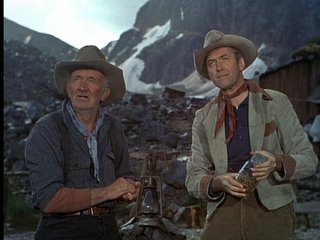
"we're going to hang it right over our front door, on the inside, so when you open the door the bell jingles, you see, on account of I like to know when my friends is comin' so I can put on another pot of coffee."
Jeff and Ben figure that if they can drive their Wyoming cattle up Klondike way, where beef's bringin' a dollar a pound on the hoof (that's better than ten dollars a pound dressed in Dawson) then it'll bankroll that ranch they want in Utah. Geographically, we're looking at a Seattle- by steamship to Skagway- through mountain passes to Dawson progression, but most of the locations were actually filmed in the Canadian Rockies. Here's Ben...
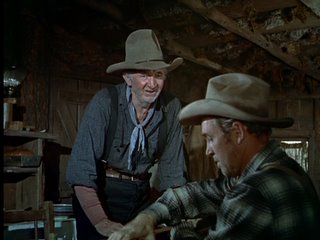
... his love of coffee will get him killed. When Jeff and Ben finally get their cattle to Dawson, they end up grubstaking a claim in yet another detour to that ranch in Utah.
I love James Stewart, but I think he's coasting a bit in this one. It is commonplace with critics to remark how directors liked to use Stewart's charm and boyishness as a platform to walk the audience through some of the weirder, darker regions of one of his roles. I'm not sure what Mann and screenwriter Borden Chase had in mind here, but Stewart's character looked at objectively is an asshole. We get some of this:
"Nobody ever did anything for nothing. What do you want me to say?"
"Say thanks."
"That's a term I seldom use."
and
"You don't like people much, do you?"
"Any reason I should?"
And we get a lot of this:
"I don't need other people. I don't need help. I can take care of me."
"I take care of me, when you're older you'll find out that's the only way."
Poor coffee lovin' Ben. This old-timer has followed Jeff all over the west, from one scheme to another, and pretty much done whatever Jeff told him, and still Jeff is ready to up and leave him with hardly a moments notice. I'm not sure what's going on here. It's not exactly a George and Lennie relationship, and anyway I'm too endeared to Walter Brennan to call him dimwitted. He's just a simple man who likes his coffee.
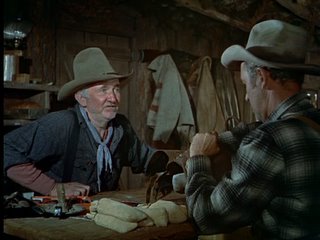
"Now look, Jeff, you and me's been together a lot of years. It's been good, real good. I ain't gonna be around much longer. I'm gettin' old, but I sort of figured we'd go on together until my time comes."
And what does Ben get in return for all his slavish devotion? Well, near as I can tell, every once in a while Jeff puts his pipe in his mouth and lights it for him.
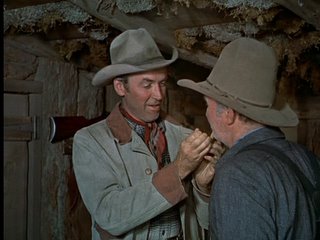
"And in a pinch," strikes a match, "I can take care of you too."
"I guess you can at that."
Some friends of mine used to have a silly running joke about how we each had our own Boris Karloff monster that did all of our bidding. When we got together to play cards or watch t.v. we would leave our monsters parked in the hall or at the dining table. Well, now I think I want to update my model to a Walter Brennan. Just so that when my life takes a nasty turn, and I feel I'm all out of options, and I want to light out west, I can turn to him and hear something like this:
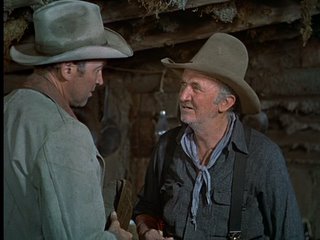
"How much do we have left? Uh, fifty dollars or thereabouts. Enough to buy flour and salt and coffee, and a shovel and a pan. We can kill our meat."
It turns out to be a long, hard trail to Dawson, with plenty of complications. Ruth Roman will serve as our Dark Woman, Miss Castle.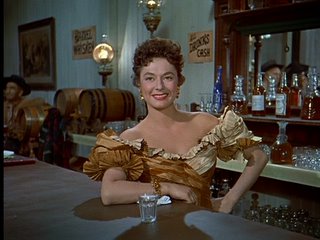
Ronda Castle is a saloon owner. She kindly helps the miners spend their hardearned gold on women, booze, and gambling. She owns the Skagway Castle and later, the Dawson Castle. She takes a shine to our Jeff the moment she sees that he's a killer who has troubles with the law. For a bad woman, she's boring.
More complications ensue when we meet our villain, the corrupt law in Skagway.
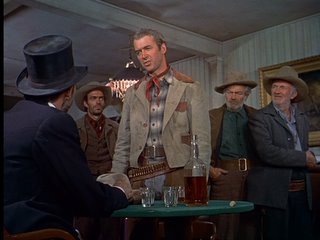
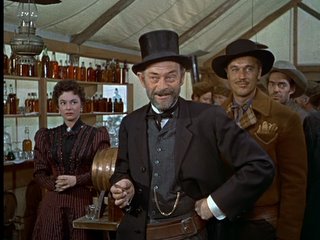
Mr. Gannon is the boss in Skagway. He likes hangin' people. He doesn't like it when somebody interrupts his hangin' people. He likes Jeff, but he still wants to hang him. And rob him of his cattle in plain sight. John McIntire's performance is the most spirited in the movie.
This here is Renee... or 'freckle face'. "I'm not a freckle face. I'm a woman."
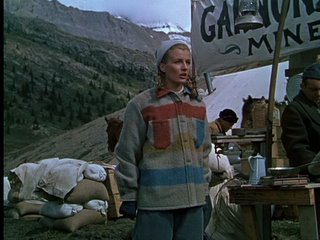
Remember, them's boobs under that thar flannel. She's what I like to call our a priori love-girl. The a priori love-girl is that girl that seems always to have loved our hero unconditionally, while he looks past her with neglect, and craps on her emotions. Maybe he will come around to her by the end, but only at the very end, and sometimes that's too late. For an example of the a priori love-girl par excellence, see Shirley MacLaine in Some Came Running.
Here we get some movie romance between Jeff and Miss Castle. This happens only hours after Jeff wasn't going to bother himself to rescue her from an avalanche. He warned her. He told her to take the trail less traveled. But you see, she's a strong-willed woman.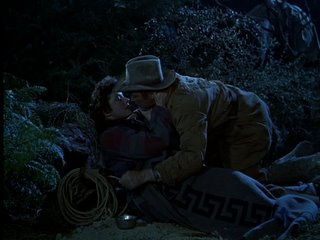
"Nothing wrong with that (being strong-willed.) That is, if you don't mind getting a broken neck."
"If I had, would it have bothered you?"
"No."
This does not make Renee happy. "I'm a woman." (He doesn't think so, you're the a priori love-girl.)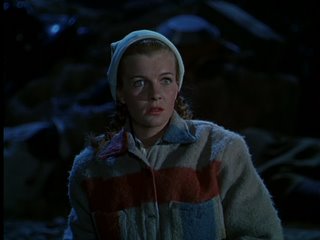
You see, Jeff didn't know that avalanche was going to happen, he just figured it might happen and it did. "Well, let's move along."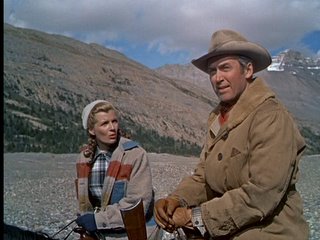
"We've got to go and help those people!"
"Of course we do, they may be dead."
"I didn't kill'em."
"But you may be able to save them if they're still alive!"
"You're wrong, Jeff. You gotta help."
"Why?"
"Why, if you don't know why. Hyup!"
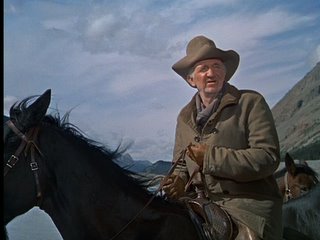
"You're wrong, Jeff. You're wrong."
Once we get to Dawson, and and Ben and Jeff start panning for gold, the movie becomes a conflict between the good folks of Dawson that want to make it a real town, and that sinful seductress Miss Castle and the evil corrupt Mr. Gannon who try to muscle in on the action.
"Sure enough, we're gonna have lamposts and sidewalks. Might even have a church."
"All this fool talk of schools and churches and law and order."
The good townfolk need a sheriff to stand up to Mr. Gannon and his thugs. Jeff is handy with a gun, up close and far away, but he'll have none of it. It's time for him to move on. The townfolk end up pinning a star on the local drunk, Rube.
As so often happens with James Stewart, he's very effective when angry or seething with a glaring intensity.
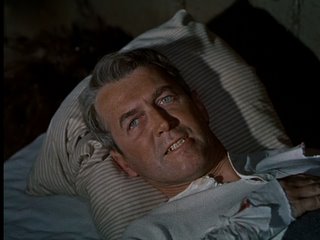
Say it through clenched teeth, "Did you sell Ben that coffee?!"
Over at the Hash House, Hominy, Grits, and Molasses entertain us on their new piano with 'O Pretty Little Primrose'.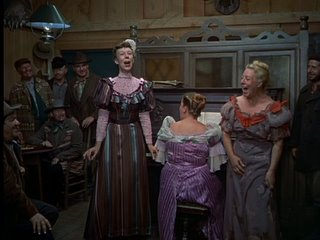
This baddie's evil grin reaches an 8 on the Jack Wilson Thug-ometer.
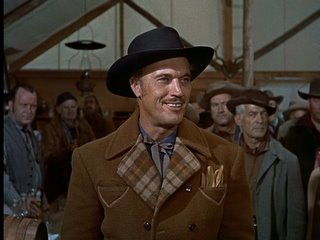
There is some nice scenery photographed by William Daniels, but I found my mind wandering to other things like Stewart's tailored cowboy get-up, and the soundtrack's post-dubbing. With some of these locations, I don't see how the microphones picked up anything but a prevailing atmospheric roar.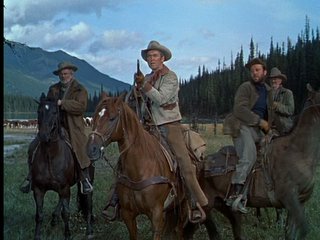
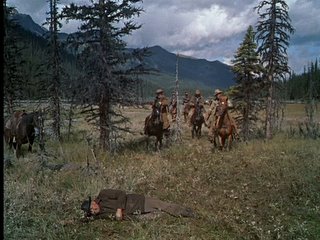
I went into this movie with the single, modest desire to see the interior of a supply store stocked full with provisions for the 'far country'. The closest I came was this exterior in the background of the shot below. Oh well, maybe my desire will be fulfilled next time at the Bend of the River.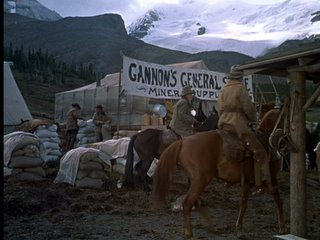
Others more dedicated can go spelunking through the caverns of this western's latent thematic content. They'll probably find about what they'd expect. The violence sanctioned by the public as a necessary foundation of law and order, or even the existence of a public at all. The dynamic between the roaming individual and those good town folk with their dream of streets, churches, and schools. Nation building. A civilization raised from a chaotic wilderness of corruption and greed. And other Liberty Valence type stuff. It's all in there somewhere, but really, why bother?
Not a great movie, or even a good movie, but western aficianados will have to look, and of course, this will be a must-own film for Jack Elam completists.
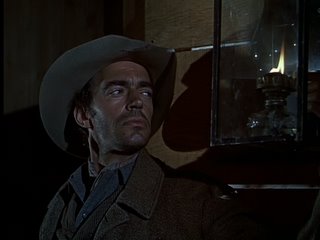
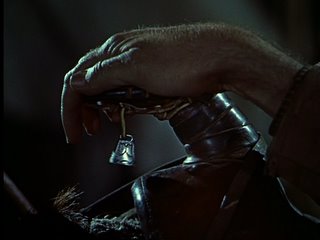
Saturday, February 25, 2006
Meet the al Askari Mosque in Samarra
 I was thinking of posting some more fine China, but thought it would be more appropriate, instead, to check out the most recent victim of Islamic radicalism. It's an impressive structure with an impressive background. This is where the 10th and 11th Imams are kept. The mosque dates back to the 10th century, around the time when Samarra was briefly the capital of the caliphate. The the gold dome was completed in 1905.
I was thinking of posting some more fine China, but thought it would be more appropriate, instead, to check out the most recent victim of Islamic radicalism. It's an impressive structure with an impressive background. This is where the 10th and 11th Imams are kept. The mosque dates back to the 10th century, around the time when Samarra was briefly the capital of the caliphate. The the gold dome was completed in 1905.
Talk about cultural insensitivity!
Professor Hasan Bolkhari: There is a cartoon that children like. They like it very much, and so do adults-Tom and Jerry.Disney? Disney!?! Sir! I burn your flag…sir! Disney my veal colored arse! Apparenly all American cartoon mice look the same to you! Suicide belts at dawn!
[...]
Some say that this creation by Walt Disney will be remembered forever. The Jewish Walt Disney Company gained international fame with this cartoon. It is still shown throughout the world. This cartoon maintains its status because of the cute antics of the cat and mouse – especially the mouse.
(link to LGF for video)
Trusting the port proxies
We don't know what kind of security there is in the UAE, Dubai Ports World or the subsidiary that is actually doing the work. We have no choice but to rely on these proxies, yet we have no basis by which to trust them.
Pull aside the rhetoric, and this is everyone's point. There are those who don't trust the Bush administration and believe its motivations are political. There are those who don't trust the UAE because of its terrorist ties -- two of the 9/11 terrorists and some of the funding for the attack came out of that country -- and those who don't trust it because of racial prejudices. There are those who don't trust security at our nation's ports generally and see this as just another example of the problem.
The solution is openness. The Bush administration needs to better explain how port security works, and the decision process by which the sale of P&O was approved. If this deal doesn't compromise security, voters -- at least the particular lawmakers we trust -- need to understand that.
Thursday, February 23, 2006
The Floating World

They packed well enough to be prepared for any possible contingency:
"The galley was filled with stamina-stretching foods. Loach, a kind of carp, swam in boat-shaped tubs of fresh water, surrounded by stores of burdocks, yams, and eggs carefully preserved in earth and sand. Into the hold were placed fifty large jars of Kidney Combustion Pellets and twenty crates of Women Delighter Pills, both powerful herbal aphrodisiacs for men. They also took aboard 250 pairs of metal masturbation balls for women, 7,000 dried taro stalks to be soaked in warm water and used by pairs of women, 600 latticed penis attachments, 2,550 water-buffalo-horn dildos, 3,500 tin dildos, 800 leather dildos, 200 erotic prints, 200 copies of The Tales of Ise, 100 loincloths, and 900 bales of tissue paper."
A fella could have a pretty good weekend in Vegas with all that. Still some things they had to get along the way:
"Checking, they found they’d forgotten many things. So then they brought aboard 200 casks of clove-oil lubricant; 400 packets of hot-sliding pepper ointment; 1,000 roots of cow-knee grass for inducing abortions; 133 pounds each of mercury, crushed cotton seeds, red pepper, and imported amaranthus roots for the same purpose; as well as various other lovemaking aid and implements. Then they loaded great numbers of stylish men’s robes and diapers."
I don't have any commentary to put on top of that - though I must I admit I kept wondering about "Kidney Combustion Pellets" for quite a while.
Tuesday, February 21, 2006
Because President Bush has so much darn credibility on the War on Terror
It's looking like coup season in the Philippines
Speaking of the Philippines, Wretchard at the Belmont Club, has a lengthy post about the Moros a hundred years ago. Riveting stuff. The book, Jungle Patrol, where his excerpts come from, is available online here. (photo from the Library of Congress)

Monday, February 20, 2006
Happy President's Day
 When it comes to leadership, the U.S. has been extraordinarily lucky. From the list of 43 presidents - very few have been just plain bad. And of those few, the union survived each one. When we've needed our presidents to step up, they've done so. The world has been a better place because of these men.
When it comes to leadership, the U.S. has been extraordinarily lucky. From the list of 43 presidents - very few have been just plain bad. And of those few, the union survived each one. When we've needed our presidents to step up, they've done so. The world has been a better place because of these men.
Memoirs of a Geisha
Lesson learned: If you’re a geisha, the only thing that will treat you worse than a Japanese man is another geisha.
Observations: The only fellow who thought enough to ask Sayuri (the main character) if she wanted to have sex was the American.
More observations: It sucks to be a geisha.
About the production: This film looks pretty good, though the camera moves a bit much in places. Prewar Kyoto should be an interesting enough setting to leave the camera in one place and soak it in.
Criticism about the casting: This film caused some anger in China because three of the biggest stars of China were portraying Japanese women.
Reception in Japan: They ignored it.
Criticism about the movie: Some of have criticized the film for not capturing the depth of the geisha world, but that seems a bit unfair. The geisha world is not very deep – not in any western sense. Saying that the film didn’t accurately depict the period is one thing, but expecting something that never existed is something else.
Casting: It was odd hearing some of these actresses speak English – but it didn’t really interfere with the film.
Ziyi Zhang – she’s the big Chinese star these days. I’m not the biggest fan, but she’s usually pretty good. Her blue contacts freaked me out in this movie.
Michelle Yeoh – If I didn’t know better, she might be Japanese. She cuts a handsome graceful figure that seemed fitting for the part.
Gong Li – is the best actress around. She can play a bitch like nobody’s business. She does so here. She’s the reason I wanted to see this picture in the first place.
Koji Yakusho and Ken Watanabe – had good chemistry. You might have recognized Ken in Tampopo. He wasn’t big then (ie - small part), but now he is. Koji is like the Jimmy Stewart of Japanese cinema. He’s one of the few Japanese stars that is entirely in film, not TV. He’s got a great face for being a Jimmy Stewart everyman type, though in this picture they made his face deformed. Still, he’s one of those guys who makes every film he’s in better.
Other comments: there are similarities between this film and another Gong Li film, Raise the Red Lantern, which was just released on DVD. While Geisha isn’t bad, Red Lantern is a masterpiece. If a fella was wanting to rent something for his wife or girlfriend, go with Geisha, but if you wanted to see something that would knock your socks off, rent Raise the Red Lantern.
Friday, February 17, 2006
THIS JUST IN....

Col. Henry Blake was shot down over the Sea of Japan in 1975. Two and a half years before that, he landed a cush job in Tokyo getting baths and massages from kimono clad nymphs. It looked like he would spend the remaining eleven years of the Korean War safe outside of a combat zone. But Hawkeye and Trapper had other things in mind for Henry. With Henry gone, Frank Burns took command of the camp and made it "regular army" - playing revelry in the mornings and having MPs remove the still from the Swamp. Unable to think about anybody but themselves, and without a thought to Henry's new found luxury, Hawk and Trap plotted alongside Henry’s trusted surrogate son, Radar, and his mistress, Leslie, to bamboozle the colonel into leaving his post in Tokyo and returning as commander to the 4077. Had Henry not returned as commander to the camp, he would have avoided that fateful flight over the Sea of Japan. Henry was survived by his two wives, Mildred and Lorraine, as well as one or two sons and a sometimes daughter.
Thursday, February 16, 2006
Meet Cowpea red
 She enjoys soft music and intimate candle-lit dinners. She likes it when her partner says silly things like "Gee, I'd like to drink soup out of you," though she'll admit that to do so might be a bit awkward. She doesn't mind ticklish facial hair but prefers clean shaven men - and occasionally a grease mustache (in case Wagstaff is interested). She considers herself Jingdezhen Ware. Although she is from the Kangxi Reign, she admits to lying about her age and saying she's from the Xianfeng Reign. She recently divorced a gourd-shaped vase and is very very available.
She enjoys soft music and intimate candle-lit dinners. She likes it when her partner says silly things like "Gee, I'd like to drink soup out of you," though she'll admit that to do so might be a bit awkward. She doesn't mind ticklish facial hair but prefers clean shaven men - and occasionally a grease mustache (in case Wagstaff is interested). She considers herself Jingdezhen Ware. Although she is from the Kangxi Reign, she admits to lying about her age and saying she's from the Xianfeng Reign. She recently divorced a gourd-shaped vase and is very very available.
Helen Thomas has been in the White Press Corp for 45 years and she’s never come across someone like Hugh Hewitt?
This interview gets to the very heart of media bias and is definitely worth listening to – or reading. Hewitt frequently asks journalists to state their bias or say who the voted for and invariably they refuse to answer. The exchange with Frau Thomas happens to be one of the more humorous ones. She parries and dodges and insists that her bias never made it into her copy and then tries to get Hewitt to admit his bias – which he quickly does – since he’s proudly transparent. She doesn’t seem to understand that a journalist can state their bias and still report facts. Amazing.
Thomas: Am I talking to a journalist?
Hewitt: Yes. Yes, for a long time. I'm just curious about what's gone wrong...
Thomas: Tell me about your career. What have you really done?
Hewitt: Well, it's not nearly as impressive as you.
Thomas: Where did...yes, it's...it's very important to me. Where did you work?
Hewitt: PBS for ten years.
Thomas: PBS?
Hewitt: Yes.
Thomas: Well, that's a good credential.
Hewitt: There you have it. See? I'm...
Thomas: But then you decided to switch over?
Hewitt: To switch over to what?
Thomas: God knows what you are.
Hewitt might as well be an alien to Thomas.
My history and political science professors in college were the same way about admitting bias. They were a generally a likable and respectable lot, but would never say what their political leanings were. And you’d have better luck discovering their secret freckle than how they voted. They didn’t want to sway the students, they’d say. My belief is that they should put that on the table and let the students “make an informed decision”. They’re free not to, of course, but I tend to trust somebody less if they hide it. There’s the rub – one side thinks their bias doesn’t interfere with their objectivity so should be of no interest to their readers or students, while the other side prefers to know where the professor or journalist is coming from. The former is what I define as arrogance, the latter, respect for the reader or student.
Towards the end of the interview, Hewitt gets her saying several opposing things and generally melting before him. If you listen to one Hewitt grilling this year, make it this interview with Frau Thomas.
Chinese pottery speaks for itself
Qing pottery dazzles with vibrant colors. But strip that away, and what do you have? Well, you still have impressive detail as this celadon piece dating from the 18th century shows:
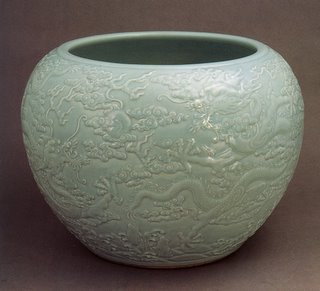
However, I prefer the more elegant Song style of pottery shown in this celadon jar dating from around 1127 to 1279:
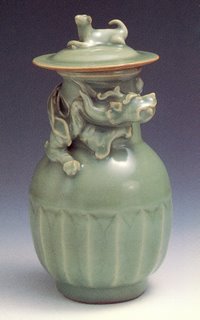 The green is so deep in the smoothness of the Song piece that you think you could just walk right into it, whereas the detail in the Qing piece keeps your eye at the surface.
The green is so deep in the smoothness of the Song piece that you think you could just walk right into it, whereas the detail in the Qing piece keeps your eye at the surface.
Tuesday, February 14, 2006
Beautiful Chinese ceramics...
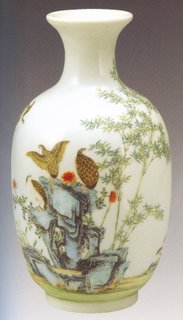









.jpg)





